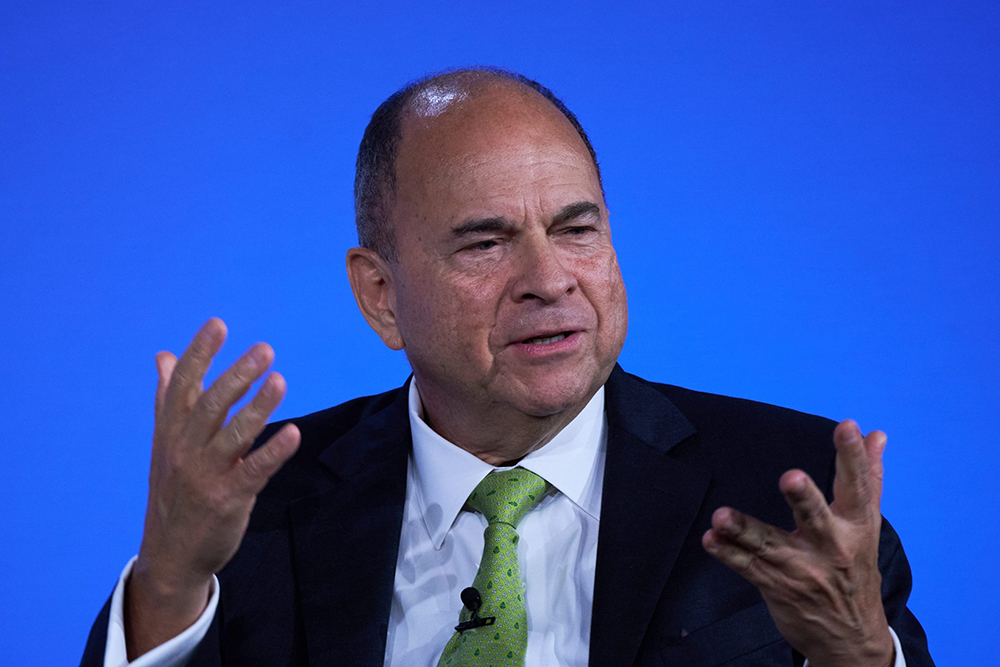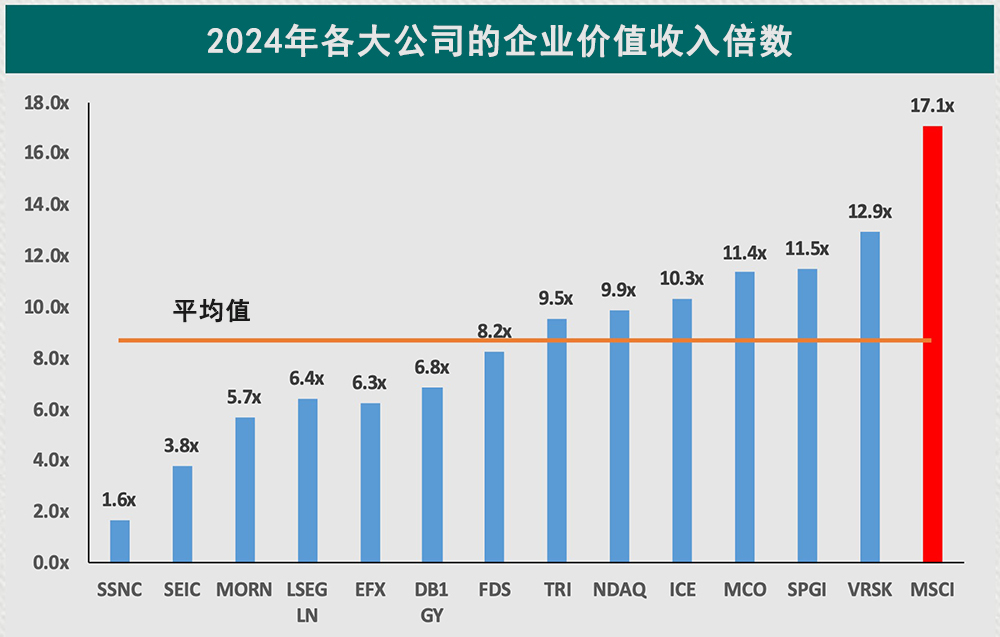
长期以来,美国的金融服务巨头明晟公司(MSCI Inc.)一直是投资者投资组合的重要组成部分。许多全球最大的基金管理公司每天都依赖明晟公司的股票、固定收益和房地产指数,以及其分析工具和环境、社会和公司治理(以下简称ESG)评级来运营。这一有利地位使该公司成为近期的强势集团,其股价在过去五年里飙升了逾225%。
但知名做空机构Spruce Point Capital Management在1月17日发布了一份利空报告,称明晟公司增长前景疲软、估值难以为继、会计和财务报告选择存疑,可能导致其股价暴跌55%至65%,旨在打破明晟公司的光环。
此外,该做空机构还声称,如果要对ESG评级领导者明晟公司进行评估,其ESG评级都不到及格线,原因是其治理存在裙带关系问题。
Spruce Point的团队在1月17日的报告中写道:“我们认为,明晟公司是典型案例,这家陷入困境的公司在进行价值破坏性(甚至更糟糕的裙带关系式)收购和股票回购的同时,未能实现公司转型,而是通过滥用财务报告和会计手段来提高收益。”
Spruce Point的创始人及首席投资官本·阿克斯勒在接受《财富》杂志采访时解释道,他在对明晟公司的调查中发现该公司出现多个“典型的危险信号”,这表明,该公司股票的交易溢价不应该接近目前的水平。从明晟公司转而在财务报告里关注经调整收益而非利润率,到斥资9.5亿美元收购商业房地产分析公司Real Capital Analytics,阿克斯勒认为,有“证据表明该公司做法与股东利益不一致”,而且存在“治理问题”,可能会给公司股票带来隐患。
明晟公司的一位代表通过电子邮件对《财富》杂志表示,该公司“断然反驳”Spruce Point 在1月17日报告中的说法。该代表说:“这份报告是一家做空机构蓄意针对我们的利益相关者发布的具有误导性的虚假信息,而且其内容缺乏完整性,目的是转移人们对明晟公司取得的成功和获得机遇的注意力。我们公司拥有浓厚的合规和道德文化氛围,我们的行为准则,以及我们致力于开展业内领先的公司治理实践奠定了相关文化基础,这一点在我们强有力的财务控制和透明的财务报告中均有所体现。”
阿克斯勒澄清道,Spruce Point“绝没有指控明晟公司存在任何违法行为”,他认为,即使该公司目前的估值远远偏离了基准,只要假以时日,明晟公司仍然有可能扭转局面。他说:“我们希望他们能够听取我们的一些批评意见,我认为很多问题可以归结为:他们能否改善治理,解决我们概述的问题,并提高透明度?”
以下是阿克斯勒对明晟公司的主要担忧。
高估值和客户保留问题
首先,阿克斯勒和Spruce Point认为,与同行相比,明晟公司的估值过高,难以为继。在1月16日发布利空报告前,这家金融服务巨头的企业价值收入倍数约为17倍(投资者用来衡量股票相对价值的常用指标),远远高于标准普尔全球(S&P Global)、纳斯达克(Nasdaq)和晨星公司(Morningstar)的企业价值收入倍数,分别约为11倍、10倍和6倍。

图片来源:SPRUCE POINT CAPITAL MANAGEMENT
Spruce Point指出,除了估值过高之外,明晟公司在客户保留方面也开始出现问题。阿克斯勒解释道:“人们认为,明晟公司的客户保留率很高,而且其产品粘性高”,这导致该股的估值很高,但他认为“这不是一成不变的”。Spruce Point称,明晟公司核心指数业务的客户保留率在过去四个季度有所下降,该业务占其收入的58%。除此之外,该部门约17%的收入来自贝莱德(BlackRock)。Spruce Point表示,贝莱德“采用了自我指数化”,降低了明晟公司产品的效用。
Spruce Point还对60家明晟公司的客户进行了调查,发现“相当大比例”的客户指出,在过去12个月里,明晟公司的竞争对手扩大了服务范围。阿克斯勒和他的团队认为,来自彭博社(Bloomberg)、旷势[Qontigo,德意志证券交易所(Deutsche Börse)旗下公司]和其他公司的竞争日趋激烈,已经开始影响明晟公司的客户保留率。
阿克斯勒告诉《财富》杂志,还有迹象表明,明晟公司正在对现有客户采取“惩罚性提价”手段,以维持收入增长。如果没有采取这些提价措施,Spruce Point预计其2023年新增经常性销售额就将下降40%。
收购存疑和裙带关系
阿克斯勒和他的团队认为,除了客户保留率下降和竞争加剧之外,明晟公司为了在短期内提高收益,选择进行的部分收购并不合理。
他们指出,明晟公司2021年以9.5亿美元收购商业地产数据和分析供应商Real Capital Analytics可能并不符合股东的最佳利益。明晟公司收购Real Capital Analytics的价格约为其运营收入的13倍,息税折旧摊销前利润(EBITDA)的48倍,估值过高。Spruce Point的简短报告称:“我们认为,此次收购充满挑战,表明明晟公司倾向于通过激进的收入和成本核算手段来夸大其财务业绩。”
报道随后引用了一位“知情前高管”的话,称此次收购让该公司陷入“彻底失控的糟糕局势”,并声称明晟公司没有进行“详尽的尽职调查”。
根据Spruce Point的说法,除了收购Real Capital Analytics之外,管理层的多项收购和行动都有裙带关系的迹象。
这家做空机构指出,明晟公司最初被称为摩根士丹利资本国际公司(Morgan Stanley Capital International),该公司与同名投行关系密切。报告写道:“太让人意外了!我们发现明晟公司最近采取了一种可疑的收购和结盟模式,从而使摩根士丹利(Morgan Stanley)和明晟公司的高管受益。我们称之为裙带关系式交易,最近出现很多这样的例子。”
Spruce Point举了三个具体例子来佐证其说法。首先,明晟公司于2022年与数字资产金融服务公司Menai Financial Group达成协议,以未披露的条款为其提供建议。但Menai是由摩根士丹利的前联席总裁佐伊·克鲁兹创立的。同样,在2023年,明晟公司以10倍于销售额的价格收购了专注于私募市场的数据和分析公司Burgiss,而明晟公司前执行委员会成员杰伊·麦克纳马拉曾经担任Burgiss的总裁。最后,在2023年12月,明晟公司以一笔未披露的金额收购了财富技术平台Fabric,后者的联合创始人曾经是摩根士丹利的首席风险官。
同样,阿克斯勒和Spruce Point并未在此指控该公司存在任何违法行为,但他们对明晟公司管理层的这些收购决策提出了质疑。
“问题是:他们完成这些交易,是因为这些交易符合明晟公司作为一家企业的最佳利益,还是因为这些交易让摩根士丹利和明晟公司的内部人士受益?”阿克斯勒对《财富》杂志表示。“我们试图通过这份报告指出,我们最近发现了一种可疑的模式,即这些交易和联盟最终涉及摩根士丹利和明晟公司的内部人士。”
会计方面的担忧,以及一家ESG评级为“F”的相关领域领导者
Spruce Point提出的另一个关切涉及会计和报告问题。首先,这家做空机构指出,明晟公司已经停止提供利润率指引,而是“修改了有关其具有吸引力的现金生成情况的措辞,同时强调经调整每股收益”。
该做空机构的报告称,明晟公司还“希望投资者忽略与软件开发活动相关的实际现金成本”,估计该公司真实的经调整每股收益比2021年报告的低28%,比2022年报告的低13%。
从“忽略”重组成本,到误把本应计入成本的收购成本计入资本,Spruce Point详细列举了一系列会计问题,称明晟公司应该解决这些股东关切的问题。
最后,Spruce Point表示,明晟公司的ESG业务正在面临日益激烈的竞争。自2020年以来,ESG评级业务一直是明晟公司的亮点,运营收入从1.38亿美元上升至2.97亿美元。但Spruce Point认为,“增长的井喷期的终结,不仅来自于ESG的阻力、监管的不确定性以及ESG的市场表现不佳,还[由于]明晟公司特有的问题导致客户流失。”
阿克斯勒告诉《财富》杂志:“我们认为,他们在这一领域的竞争优势正在缩小。彭博社正在强化解决方案。穆迪(Moody’s)、纳斯达克等一些交易所也能够收集ESG数据……因此,我们认为,这项业务正在放缓,企业价值收入倍数应该会被压缩。”
除此之外,如果你用环境、社会和公司治理的标准对明晟公司进行评级,它的表现就可能有负众望。作为一家金融服务公司,环境、社会和公司治理标准中的环境部分对明晟公司来说并不是什么大问题。但阿克斯勒认为,该公司的治理问题非常严重,总体ESG评级可能会获得“F”评级。
据Spruce Point称,明晟公司存在的问题不胜枚举。例如,明晟公司的首席会计官于2023年8月辞职,但无人接替。明晟公司的一名董事还与软件公司SolarWinds有牵连,该公司在2023年10月底被美国证券交易委员会(SEC)指控欺诈。此外,明晟公司的审计师严重缺乏美国会计经验。阿克斯勒还指出,明晟公司推出的指数可能会使该公司的“社会”评级受到质疑,其中包括一些关注中国或航空航天和国防股票的指数。
阿克斯勒说:“明晟公司是ESG评级的领导者,但没有人真正对该公司进行评级。我认为我们正在试图坚持独立的观点。当我们做空这只股票时,不一定是毫无偏见的,但我认为,我们试图质疑的是,一家对其他公司的ESG要素进行评级的公司是否经得起评估检验?我们发现该公司存在很多不足之处,很多地方亟需改进。”(财富中文网)
译者:中慧言-王芳
长期以来,美国的金融服务巨头明晟公司(MSCI Inc.)一直是投资者投资组合的重要组成部分。许多全球最大的基金管理公司每天都依赖明晟公司的股票、固定收益和房地产指数,以及其分析工具和环境、社会和公司治理(以下简称ESG)评级来运营。这一有利地位使该公司成为近期的强势集团,其股价在过去五年里飙升了逾225%。
但知名做空机构Spruce Point Capital Management在1月17日发布了一份利空报告,称明晟公司增长前景疲软、估值难以为继、会计和财务报告选择存疑,可能导致其股价暴跌55%至65%,旨在打破明晟公司的光环。
此外,该做空机构还声称,如果要对ESG评级领导者明晟公司进行评估,其ESG评级都不到及格线,原因是其治理存在裙带关系问题。
Spruce Point的团队在1月17日的报告中写道:“我们认为,明晟公司是典型案例,这家陷入困境的公司在进行价值破坏性(甚至更糟糕的裙带关系式)收购和股票回购的同时,未能实现公司转型,而是通过滥用财务报告和会计手段来提高收益。”
Spruce Point的创始人及首席投资官本·阿克斯勒在接受《财富》杂志采访时解释道,他在对明晟公司的调查中发现该公司出现多个“典型的危险信号”,这表明,该公司股票的交易溢价不应该接近目前的水平。从明晟公司转而在财务报告里关注经调整收益而非利润率,到斥资9.5亿美元收购商业房地产分析公司Real Capital Analytics,阿克斯勒认为,有“证据表明该公司做法与股东利益不一致”,而且存在“治理问题”,可能会给公司股票带来隐患。
明晟公司的一位代表通过电子邮件对《财富》杂志表示,该公司“断然反驳”Spruce Point 在1月17日报告中的说法。该代表说:“这份报告是一家做空机构蓄意针对我们的利益相关者发布的具有误导性的虚假信息,而且其内容缺乏完整性,目的是转移人们对明晟公司取得的成功和获得机遇的注意力。我们公司拥有浓厚的合规和道德文化氛围,我们的行为准则,以及我们致力于开展业内领先的公司治理实践奠定了相关文化基础,这一点在我们强有力的财务控制和透明的财务报告中均有所体现。”
阿克斯勒澄清道,Spruce Point“绝没有指控明晟公司存在任何违法行为”,他认为,即使该公司目前的估值远远偏离了基准,只要假以时日,明晟公司仍然有可能扭转局面。他说:“我们希望他们能够听取我们的一些批评意见,我认为很多问题可以归结为:他们能否改善治理,解决我们概述的问题,并提高透明度?”
以下是阿克斯勒对明晟公司的主要担忧。
高估值和客户保留问题
首先,阿克斯勒和Spruce Point认为,与同行相比,明晟公司的估值过高,难以为继。在1月16日发布利空报告前,这家金融服务巨头的企业价值收入倍数约为17倍(投资者用来衡量股票相对价值的常用指标),远远高于标准普尔全球(S&P Global)、纳斯达克(Nasdaq)和晨星公司(Morningstar)的企业价值收入倍数,分别约为11倍、10倍和6倍。
公司简称注释:SS&C科技控股公司(SSNC);SEI投资公司(SEIC);晨星公司(MORN);伦敦证券交易所集团公司(LSEG LN);艾可菲(EFX);德意志交易所集团(DB1 GY);慧甚研究系统公司(FDS);汤森路透(TRI);纳斯达克(NDAQ);洲际交易所(ICE);穆迪(MCO);标普全球(SPGI);威瑞斯克分析(VRSK);明晟公司(MSCI)
Spruce Point指出,除了估值过高之外,明晟公司在客户保留方面也开始出现问题。阿克斯勒解释道:“人们认为,明晟公司的客户保留率很高,而且其产品粘性高”,这导致该股的估值很高,但他认为“这不是一成不变的”。Spruce Point称,明晟公司核心指数业务的客户保留率在过去四个季度有所下降,该业务占其收入的58%。除此之外,该部门约17%的收入来自贝莱德(BlackRock)。Spruce Point表示,贝莱德“采用了自我指数化”,降低了明晟公司产品的效用。
Spruce Point还对60家明晟公司的客户进行了调查,发现“相当大比例”的客户指出,在过去12个月里,明晟公司的竞争对手扩大了服务范围。阿克斯勒和他的团队认为,来自彭博社(Bloomberg)、旷势[Qontigo,德意志证券交易所(Deutsche Börse)旗下公司]和其他公司的竞争日趋激烈,已经开始影响明晟公司的客户保留率。
阿克斯勒告诉《财富》杂志,还有迹象表明,明晟公司正在对现有客户采取“惩罚性提价”手段,以维持收入增长。如果没有采取这些提价措施,Spruce Point预计其2023年新增经常性销售额就将下降40%。
收购存疑和裙带关系
阿克斯勒和他的团队认为,除了客户保留率下降和竞争加剧之外,明晟公司为了在短期内提高收益,选择进行的部分收购并不合理。
他们指出,明晟公司2021年以9.5亿美元收购商业地产数据和分析供应商Real Capital Analytics可能并不符合股东的最佳利益。明晟公司收购Real Capital Analytics的价格约为其运营收入的13倍,息税折旧摊销前利润(EBITDA)的48倍,估值过高。Spruce Point的简短报告称:“我们认为,此次收购充满挑战,表明明晟公司倾向于通过激进的收入和成本核算手段来夸大其财务业绩。”
报道随后引用了一位“知情前高管”的话,称此次收购让该公司陷入“彻底失控的糟糕局势”,并声称明晟公司没有进行“详尽的尽职调查”。
根据Spruce Point的说法,除了收购Real Capital Analytics之外,管理层的多项收购和行动都有裙带关系的迹象。
这家做空机构指出,明晟公司最初被称为摩根士丹利资本国际公司(Morgan Stanley Capital International),该公司与同名投行关系密切。报告写道:“太让人意外了!我们发现明晟公司最近采取了一种可疑的收购和结盟模式,从而使摩根士丹利(Morgan Stanley)和明晟公司的高管受益。我们称之为裙带关系式交易,最近出现很多这样的例子。”
Spruce Point举了三个具体例子来佐证其说法。首先,明晟公司于2022年与数字资产金融服务公司Menai Financial Group达成协议,以未披露的条款为其提供建议。但Menai是由摩根士丹利的前联席总裁佐伊·克鲁兹创立的。同样,在2023年,明晟公司以10倍于销售额的价格收购了专注于私募市场的数据和分析公司Burgiss,而明晟公司前执行委员会成员杰伊·麦克纳马拉曾经担任Burgiss的总裁。最后,在2023年12月,明晟公司以一笔未披露的金额收购了财富技术平台Fabric,后者的联合创始人曾经是摩根士丹利的首席风险官。
同样,阿克斯勒和Spruce Point并未在此指控该公司存在任何违法行为,但他们对明晟公司管理层的这些收购决策提出了质疑。
“问题是:他们完成这些交易,是因为这些交易符合明晟公司作为一家企业的最佳利益,还是因为这些交易让摩根士丹利和明晟公司的内部人士受益?”阿克斯勒对《财富》杂志表示。“我们试图通过这份报告指出,我们最近发现了一种可疑的模式,即这些交易和联盟最终涉及摩根士丹利和明晟公司的内部人士。”
会计方面的担忧,以及一家ESG评级为“F”的相关领域领导者
Spruce Point提出的另一个关切涉及会计和报告问题。首先,这家做空机构指出,明晟公司已经停止提供利润率指引,而是“修改了有关其具有吸引力的现金生成情况的措辞,同时强调经调整每股收益”。
该做空机构的报告称,明晟公司还“希望投资者忽略与软件开发活动相关的实际现金成本”,估计该公司真实的经调整每股收益比2021年报告的低28%,比2022年报告的低13%。
从“忽略”重组成本,到误把本应计入成本的收购成本计入资本,Spruce Point详细列举了一系列会计问题,称明晟公司应该解决这些股东关切的问题。
最后,Spruce Point表示,明晟公司的ESG业务正在面临日益激烈的竞争。自2020年以来,ESG评级业务一直是明晟公司的亮点,运营收入从1.38亿美元上升至2.97亿美元。但Spruce Point认为,“增长的井喷期的终结,不仅来自于ESG的阻力、监管的不确定性以及ESG的市场表现不佳,还[由于]明晟公司特有的问题导致客户流失。”
阿克斯勒告诉《财富》杂志:“我们认为,他们在这一领域的竞争优势正在缩小。彭博社正在强化解决方案。穆迪(Moody’s)、纳斯达克等一些交易所也能够收集ESG数据……因此,我们认为,这项业务正在放缓,企业价值收入倍数应该会被压缩。”
除此之外,如果你用环境、社会和公司治理的标准对明晟公司进行评级,它的表现就可能有负众望。作为一家金融服务公司,环境、社会和公司治理标准中的环境部分对明晟公司来说并不是什么大问题。但阿克斯勒认为,该公司的治理问题非常严重,总体ESG评级可能会获得“F”评级。
据Spruce Point称,明晟公司存在的问题不胜枚举。例如,明晟公司的首席会计官于2023年8月辞职,但无人接替。明晟公司的一名董事还与软件公司SolarWinds有牵连,该公司在2023年10月底被美国证券交易委员会(SEC)指控欺诈。此外,明晟公司的审计师严重缺乏美国会计经验。阿克斯勒还指出,明晟公司推出的指数可能会使该公司的“社会”评级受到质疑,其中包括一些关注中国或航空航天和国防股票的指数。
阿克斯勒说:“明晟公司是ESG评级的领导者,但没有人真正对该公司进行评级。我认为我们正在试图坚持独立的观点。当我们做空这只股票时,不一定是毫无偏见的,但我认为,我们试图质疑的是,一家对其他公司的ESG要素进行评级的公司是否经得起评估检验?我们发现该公司存在很多不足之处,很多地方亟需改进。”(财富中文网)
译者:中慧言-王芳
The American financial services giant MSCI has long been a staple of investors’ portfolios. Many of the world’s largest money managers rely on MSCI’s equity, fixed income, and real estate indexes, as well as its analytics tools, and its ESG ratings, to operate each day. That favored position has made the company a powerhouse of late, with its stock surging more than 225% over the past five years.
But noted short-seller Spruce Point Capital Management aims to puncture MSCI’s halo, issuing a short report on January 17 that argues the company’s weak growth prospects, unsustainable valuation, and dubious accounting and financial reporting choices could lead its stock to plummet 55% to 65%.
Moreover, the short seller claimed that the ESG ratings leader MSCI would itself receive a failing ESG rating if it were to be evaluated, due to its governance issues that have an air of nepotism.
“We believe MSCI is a classic case of a struggling company failing to transform itself while engaging in value-destructive (and even worse nepotism-like) acquisitions and share repurchases with abusive financial reporting and accounting tactics to bolster earnings,” Spruce Point’s team wrote in its January 17 report.
In an interview with Fortune, Spruce Point’s founder and chief investment officer, Ben Axler, explained that he saw multiple “classic red flags” at MSCI during his investigation of the company that indicate its stock shouldn’t be trading anywhere near the premium it enjoys today. From MSCI’s shift to focusing on adjusted earnings instead of margins in its financial reporting, to its questionable $950 million acquisition of the commercial real estate analytics company Real Capital Analytics, Axler argues that there is “evidence of misalignment with shareholders” and “governance issues” that could spell trouble for stock.
An MSCI representative told Fortune via email that the company “categorically refutes the claims” made in Spruce Point’s Jan. 17 report. “This report is an intentional attempt by a short-seller to target our stakeholders with misleading, incomplete and false information that aims to distract from MSCI’s successes and opportunities,” the representative said. “MSCI has a strong culture of compliance and ethics grounded in our code of conduct and our commitment to leading corporate governance practices, demonstrated through our robust financial controls and transparent financial reporting.”
Axler clarified that Spruce Point is “definitely not alleging anything illegal,” and he thinks MSCI can still turn things around given time, even if the current valuation is way off base. “We hope they listen to some of our criticisms,” he said. “I think a lot of it boils down to: can they improve their governance, fix some of the things we’ve outlined, and be more transparent?”
Here’s a look at some of Axler’s main concerns when it comes to MSCI.
A lofty valuation and client retention issues
First and foremost, Axler and Spruce Point argue that MSCI is trading at an unsustainable and “extreme” valuation relative to its peers. The financial services giant’s enterprise value to revenue multiple, a common metric used by investors to measure the relative value of a stock, was around 17x on January 16 before the short report. That’s substantially higher than its peers S&P Global, Nasdaq, and Morningstar, at roughly 11x, 10x, and 6x, respectively.
In addition to being expensive, MSCI is beginning to have issues with customer retention, Spruce Point noted. Axler explained, “there’s a belief that [MSCI] has a high client retention rate. And it’s a sticky product,” which had led to the stock boasting a high valuation, but he believes “that’s not immutable.” The client retention rate in MSCI’s core index business, which makes up 58% of revenue, has declined for the past four quarters, Spruce Point noted. On top of that, roughly 17% of that segment’s revenue comes from BlackRock, which Spruce Point says has “embraced self-indexing,” reducing the utility of MSCI’s products.
Spruce Point also conducted a survey of 60 MSCI clients and found that “a substantial percentage” reported more outreach from competitors in the last 12 months. Axler and his team argue that rising competition from Bloomberg, Qontigo (which is owned by Deutsche Börse), and others is beginning to impact client retention.
There are also signs that MSCI is using “punitive price increases” on existing customers to maintain revenue growth, Axler told Fortune. Without these increases, Spruce Point estimates that new recurring sales fell 40% in 2023.
Questionable acquisitions and whiffs of nepotism
Beyond waning client retention and increasing competition, Axler and his team believe that MSCI has opted for acquisitions that don’t always make sense in order to boost its earnings over the near term.
They argue that MSCI’s 2021 acquisition of the commercial real estate data and analytics provider Real Capital Analytics (RCA) for $950 million might not have been in the best interest of shareholders. MSCI purchased RCA for roughly 13 times its run-rate revenue and 48 times EBITDA, a lofty valuation. “We believe the acquisition was littered with challenges and shows MSCI’s propensity for aggressive revenue and cost accounting to inflate its financial performance,” Spruce Point’s short report reads.
The report then cites a “former executive close to the situation,” who it says called the acquisition “a dumpster fire” and claimed that MSCI did not do “enough due diligence.”
Beyond the RCA acquisition, multiple purchases and actions by management had a hint of nepotism, according to Spruce Point.
The short-seller noted that MSCI originally was called Morgan Stanley Capital International, and the company has close ties with the investment bank of the same name. “Surprise, surprise! We find that MSCI has recently engaged in a suspicious pattern of making acquisitions and alliances that benefit Morgan Stanley and MSCI alums,” the report reads. “We term this nepotism-like dealing and there are many recent examples.”
Spruce Point gave three specific examples for its claims. First, MSCI struck a deal with the digital asset financial services firm Menai Financial Group in 2022 to provide advice on undisclosed terms. But Menai was founded by Zoe Cruz, a former co-president at Morgan Stanley. Similarly, in 2023, MSCI paid 10 times sales for Burgiss, a data and analytics firm that focuses on private markets, where Jay McNamara, a former executive committee member at MSCI, was president. And finally, in December 2023, MSCI paid an undisclosed amount to acquire the wealth technology platform Fabric, whose co-founder was formerly Morgan Stanley’s chief risk officer.
Again, Axler and Spruce Point are not alleging anything illegal here, but they are calling into question MSCI’s management’s decisions when it comes to these acquisitions.
“The question has to be: Are they doing these deals because they’re in the best interest for MSCI as a business or are they doing these deals because they benefit people in the sphere of Morgan Stanley and MSCI?” Axler told Fortune. “We’re trying to point out with the report that we’ve seen a suspicious pattern recently of these deals and alliances ultimately involving people within the sphere of Morgan Stanley and MSCI.”
Accounting concerns—and an ESG ratings leader with an ‘F’ rating
Another concern Spruce Point put forward touches on accounting and reporting issues. First, the short-seller notes that MSCI has stopped providing margin guidance and instead “modified its language about its attractive cash generation profile, while now emphasizing Adjusted EPS.”
The short sellers’ report alleges that MSCI also “wants investors to ignore real cash costs associated with software development activities,” estimating that the firm’s true adjusted EPS was 28% lower than what was reported in 2021 and 13% lower than what was reported in 2022.
From “ignoring” restructuring costs to incorrectly capitalizing acquisition costs that were supposed to be expensed, Spruce Point details a string of accounting issues that, it says, should be addressed by MSCI and are a concern for shareholders.
Finally, MSCI’s ESG business is facing increasing competition, according to Spruce Point. The ESG ratings business has been a bright spot for MSCI since 2020, with run rate revenue rising from $138 million to $297 million. But Spruce Point believes that “the growth spurt is ending not only from ESG pushback, regulatory uncertainty, and ESG’s market underperformance, but also [due to] MSCI-specific issues that are resulting in client loss.”
“Their competitive advantage in the business, we think, is narrowing,” Axler told Fortune. “Because you’ve got Bloomberg beefing up solutions. You’ve got Moody’s, you’ve got some of the exchanges in there, like NASDAQ, that are able to collect ESG data…So we think that business is slowing, and the multiples should be compressing.”
On top of that, if you were to rate MSCI on an environmental, social, governance scale, it might not do very well. As a financial services company, the environmental part of the ESG scale wouldn’t be much of an issue for MSCI. But Axler argued that the company’s governance issues are so serious that it would likely receive an ‘F’ ESG rating overall.
The list of issues at MSCI, according to Spruce Point, goes on and on. MSCI’s chief accounting officer, for example, resigned in August without being replaced. A director at MSCI was also involved with the software company SolarWinds, which was charged by the SEC with fraud at the end of October. And there is a serious lack of U.S. accounting experience among MSCI’s auditors. Axler also noted that MSCI has launched indices that could put the company’s “social” rating in question, including some that focus on Chinese or aerospace and defense equities.
“MSCI is an ESG ratings leader, but nobody’s really rated them. I think we’re trying to take an independent view. It’s not necessarily an unbiased one when we’re short the stock, but I think, we’re trying to question, does the company that rates others’ ESG factors stand up after a review?” Axler said. “And we find a lot of shortcomings. We think a lot of things could be improved.”






